admin
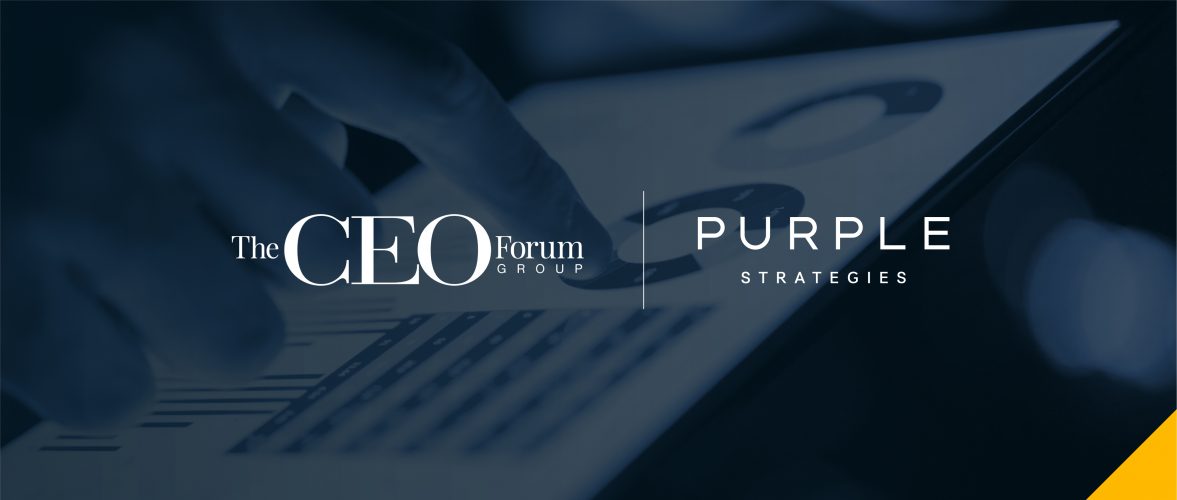
Posted on
September 22, 2021
2 Min. Read
Author
Purple Strategies
New CEO Research Project Surfaces Data From and For CEOs to Guide Executive Action
Purple is introducing our new CEO Research Project, developed with our partners at The CEO Forum Group, a media and content company that serves, connects and convenes the CEO community.
Each week, the project collects insights on news of the day from top CEOs while surfacing data, context and insight to guide executive action.
Examples of data stories developed through the project can be found below. Explore all the CEO Research Project insights on the project website or weekly on the Purple LinkedIn and Twitter channels.
CEOs Bullish on Economic Forecast
Read on the CEO Research Project site
When polled during the June 2021 Transformative CEO Summit, CEOs and other executives gathered virtually at the event expressed optimism that we are emerging from the pandemic into significant economic opportunity – betting on pent-up consumer demand and COVID-necessitated efficiencies like increases in automation and greater adoption of technology to prevail over looming warning signs including supply chain issues, rising inflation and resurgent case counts.
Empathy and Human Connection Needs on the Rise
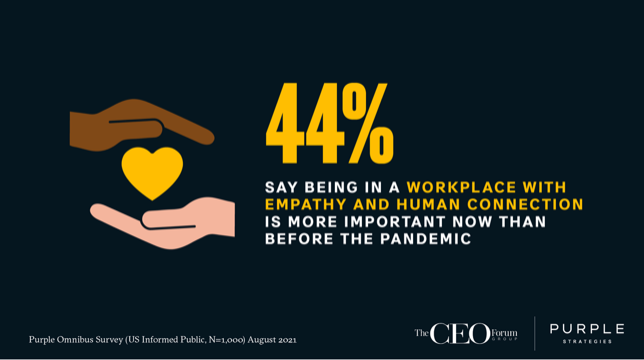
Read on the CEO Research Project site
When leading CEOs gathered early this year for the first-ever Transformative CEO Summit to discuss the unprecedented events of the past year and ways they will shape the path forward for corporations, the importance and resurgence of human connection emerged as the unifying lens. New public polling indicates the CEOs were right. For 44% of the Informed Public, being in a workplace with more empathy and human connection is more important to them now than it was before the pandemic. The increase in importance is even more true for younger employees (52% for those 18-34 years old), employees who are parents (49%), employees working in a fully remote or hybrid environment (49% each), or whose volume of work (48%) or level of work-related stress (53%) has gone up during the pandemic. These groups all account for a huge share of any workforce. An additional 40% of respondents say it’s no more important now than before, but empathy and human connection in the workplace is still important to them.
Company Favorability Rises When CEOs Speak Against Injustice
Read on the CEO Research Project site
CEOs today are expected to lead not only on issues directly related to their business but also on key issues of society at large. Among adults who regularly follow the news, 3 in 4 (77%) say they’d view a company favorably (31%, much more favorably) following a CEO making a public statement against injustice. And while such expectations have historically been considered a demand coming from just one end of the political spectrum, the reality is that support today cuts across political party lines – with any remaining political divide disappearing with each new generation.
While there is a meaningful gap between Democrats and Republicans overall in viewing that CEO action favorably (90% favorable for Democrats; 57% favorable for Republicans), the gap closes significantly for adults under the age of 55, bringing all groups near or above that 3-in-4 favorable threshold. For adults 35-54 years of age, 93% of Democrats and 65% of Republicans would view a company more favorably if its CEO issued a statement against injustice. For the 18-34 age group, the gap narrows significantly, with 86% of Democrats and 75% of Republicans viewing the action favorably.
Go deeper:
“It’s no longer a choice to separate executive reputation from corporate reputation.” – Explore the insight from Futurecasting by Purple Strategies.

Posted on
April 22, 2020
5 Min. Read
Author
Rebecca Ballard
Five Best Practices For Internal Communications During COVID
There’s plenty of literature about planning the “first 100 days” in your new job, but none that accounts for an overlap with a global pandemic. I hit that 100-day milestone in my new role as head of communications, marketing and engagement at Purple on day 25 of social distancing during the COVID-19 crisis.
It’s been a unique experience, trying to build something new with a company while the world feels like it’s falling apart. Instead of marking the 10th anniversary of Purple and its new brand and sharing stories from the team’s success, which was a key focus of the original 100-day plan, we’ve been retooling our business together day by day, and week by week, so our teams have what they need to support Purple clients in preparing for and navigating the immense changes they face – and feel supported themselves as they navigate the changes in their own lives.
I can’t say that creating a pandemic roadmap to add to the “first 100 days” literature was something we set out to do. But I can say we’ve taken steps that are proving to be successful at this moment. The culture built here over 10 years, that I learned in person for 45 days, and that we’ve been adapting every day since, has positioned our company and team to navigate this change as best as we could hope for, under the circumstances. To the extent that it might be helpful to anyone else managing these times as a communicator or leader, I wanted to share some of the ways we’ve been navigating it all.
(1) Keep leaders accessible.
During normal times, Purple’s COO and operations team hold a joint open office hours every other week as a standing opportunity for any employee to drop in to ask questions, discuss issues, provide feedback, suggest new ideas, and just in general have an audience with the person running the business day to day. Since this crisis began, our leader doubled down: these open office hours now happen weekly, and virtually. People videoconference in with their morning coffee in hand and talk about what’s happening with clients, what’s happening in our homes, what has us worried and what has us laughing. At a time when there might be more questions than answers, some leaders might be tempted to limit these types of activities in favor of more controlled formats. Don’t. Keep your leaders accessible, and if you are a leader, BE accessible. Your employees need to see you now more than ever.
(2) Communicate frequently and transparently.
We’re on week eight of having at least one COVID-related, all-staff communication per week, which are then reinforced on client teams, in group meetings, and during 1:1 check-ins. Beginning the first week of March, these communications covered new cleaning procedures and reminders to stay home when sick, then moved on to suspending work travel and mobilizing all staff for extended, fully remote work. Next were “abundance of caution” notifications of potential exposures we’d learned about, and how we were going to keep our culture alive while physically apart. Then we moved into messages starting to discuss openly the difficult decisions we’re having to make and the longer-term business realities from which no businesses are immune. We’ve had messages that bring levity and some that bring a gut-punch, but they’re frequent, authentic, and candid. It might be tempting to go silent when you don’t have good news to share or all the answers to deliver, but that approach will not work right now. No one expects their leaders to know what the outcome will be, but they do expect to know the inputs – what actions you are taking. And they want to know they can trust you to be honest and clear.
(3) Embrace humanity.
For years organizational culture people have been advocating for making work more human. The sudden, forced integration of our working and non-working lives has put these issues into stark relief. Overnight, many of the responsibilities we shoulder outside our office walls have shown up on Zoom and BlueJeans screens for our colleagues to see. One of our first cultural expectations we set for this time is that there is no reason to hide these responsibilities. We encouraged our team to re-design their own personal work day as needed – however unconventional that needed to look – to time block for child care, elder care, home schooling, dog-walking, personal fitness, mental health breaks or whatever personal responsibilities that now need to be addressed differently in this new environment. And we encouraged the free sharing of this information among teams and on Slack statuses. It’s common now to see laundry-folding, kid-hair-brushing and baby-handoffs during calls – this is encouraged and modeled from the very top of our company, and our team members feel more supported and less anxious because of it. It is critically important that you visibly embrace your humanity right now, especially if you are a leader. Don’t be a work-life ninja. By openly modeling your work-life integration, you give your team permission to do the same.
(4) Adapt meaningfully and apply new learning quickly.
One of the things that became clear fast during my 45 days in person is that Purple people love meetings. These aren’t the meetings you hear about in office jokes and memes and “shoulda been an email” comments; these are meetings that have meaning. Whether it’s a blue sky ideas session, a targeted brainstorm, or an insights workshop, meetings at Purple are not a spectator sport – engagement is essential. So when many of our colleagues were suddenly having to run pandemic home schools during the hours when they were used to being fully free to engage in these meetings, we quickly and collectively knew we needed to adapt our approach to meetings. Our client teams each circled their wagons to reassess and scale back the number of meetings on the group calendar and worked to free up blocks of time for team members to do uninterrupted work. Our in-house brainstorm and meeting facilitation experts rallied to develop and roll out best practices for virtual meetings in the current climate. And a few weeks into our new work-from-home arrangements, we hosted a virtual happy hour to share best practices across teams and workshop even more ideas for adapting campaign, project and team management in this environment. Even the strongest or best-loved elements of your work culture might need to change right now to accommodate new workplace realities. Tap into your teams’ experiences and insights to experiment, assess, adapt and reset. The adaptations you make now don’t have to become permanent if you don’t want or need them to – by definition, we’re in an in-between state. Stay open and flexible to evolution and new possibilities.
(5) Build culture constantly.
In addition to their love of meetings (as explained above), Purple people love being around Purple people. I didn’t need all 45 in-person days to learn this; I learned it day 1. And as a student of organizational culture, I love it. People eat lunch together, serve on committees together, plan happy hours and book clubs together, do improv comedy together, travel to all the NCAA Final Fours together – in short, the fabric of Purple is woven tightly. Anyone lucky enough to be part of a company culture like this, knows that the physical distancing of this pandemic time period was a shock to the system. But this team didn’t miss a beat. Everyone owns culture at Purple, so everyone has been part of the solution. New Slack channels have emerged to replace some of the informal connections, and chatter on existing channels has increased. After 10 years of gathering in person, we held our first-ever, all-virtual, all-staff meeting. We started an “At Home With Purple” employee profile series, each day sharing little-known details about one colleague’s life at home. We’ve joined one virtual happy hour to discuss the Fyre Festival, one happy hour to discuss Tiger King, and a host of others, just to keep connections alive. Every company culture is different, and each one is precious. During this relentless change, do everything you can to keep yours alive. Let your “how” shift and adapt as needed, but keep your “why” sacred. It doesn’t show up on a financial statement or dashboard, but it will be one of the most valuable assets you’ll have when we emerge on the other side of these challenges.
My new colleagues have spent the bulk of my first 100 days at Purple focused on helping our clients to prepare for and manage the most significant change of their lifetimes, while I’ve been working with our team to do the same on behalf of Purple. We haven’t gotten everything right, but I hope what we’ve learned might help someone else as they chart a course through their next 100 days.
(A version of this article first appeared on LinkedIn)

Posted on
April 15, 2020
2 Min. Read
Author
Purple Strategies
Labor, Layoffs and Reputation
As the COVID-19 crisis continues to disrupt the U.S. economy, the decline in employment affecting small businesses and large corporations is staggering. Many companies probably entered March feeling they could weather this storm and are now experiencing or bracing for major impacts to their business and additional impacts on their labor and human capital needs.
While every company has unique circumstances, for the most part Americans can understand why airlines, hotels, restaurants and others are universally struggling. Soon, however, industries that seem to be less-obviously and less-directly impacted will follow suit – harmed by the continued slowdown of the economy, sustained business closures, and weakened consumer demand. And while layoffs and furloughs may be unavoidable, how you do it says a lot about the character of your company and its leadership.
In a memo to clients, Purple looks at considerations that would affect how layoffs and furloughs might impact long-term impact to corporate reputation, such as:
– The size of your company and its perceived economic strength pre-COVID-19
– How you announce layoffs or furloughs
– How outgoing employees are treated
– What other business decisions were recently or simultaneously announced
– What your leadership is saying and what sacrifices they may be making themselves
– What your competitors are doing
For more, read the complete memo on labor, layoffs and reputation from Purple managing director Rory Cooper. If you have questions or want a sounding board on issues you are confronting in the COVID-19 health crisis, please don’t hesitate to reach out to Rory or another member of the Purple team.
Rory Cooper (rory.cooper@purplestrategies.com)
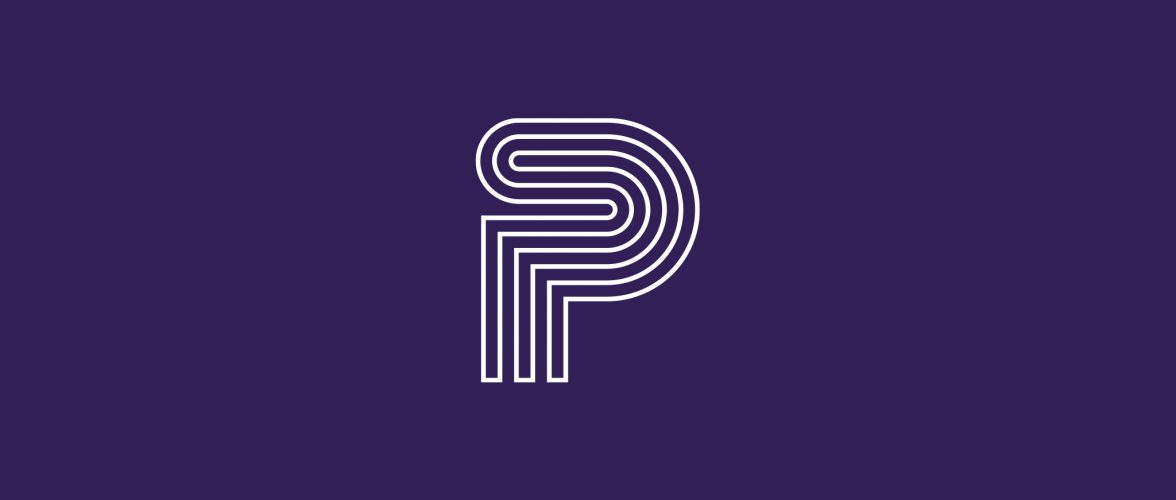
Posted on
April 1, 2020
2 Min. Read
Author
Purple Strategies
Change with a capital C
We talk about change a lot here at Purple, mostly with our clients, but also with our colleagues. Why? Because in today’s volatile landscape, all brands and corporations must be adequately equipped to handle change. We partner with our clients to help them prepare for change, manage change when it’s thrust upon them, and compel change of their own.
What does this mean during this time when we are all witnessing an unprecedented rate of immense change? It means we are supporting our clients and colleagues in any way that we can. It means keeping a finger on the pulse of what and how society is doing, tracking larger geopolitical and societal trends and motivations, tapping into our network of partners, and much more.
As we reflect on our past 10 years as Purple and look ahead to the next 10, we’ve taken a page out of our own playbook and reinvented our brand to better align with who we are today. Our new logo features a stylized P made up of three pathways, each one emblematic of Purple’s approach to helping clients prepare for, manage, and compel change.
We couldn’t have imagined how profound a role change would be playing across all aspects of life today – or predicted that change would be defining the new normal both professionally and personally in all of our futures. As paths ahead become less clear, and we continue to examine our response and rebound from this global moment of change, we’ll continue to move forward with our clients, navigating these unique and uncertain pathways together.

Posted on
March 25, 2020
2 Min. Read
Author
Purple Strategies
The Reputational Impact of Accepting a Federal Bailout
The federal government is bailing out many vulnerable industries as the economic impacts of Coronavirus are felt. Hospitality, travel, airlines, aerospace, food, retail and manufacturing are just some of the major sectors that stand to benefit from this assistance, with more possible in the weeks and months to come.
For business leaders, a financial stimulus will have immediate impact on managing the day-to-day response to the pandemic. Alongside those immediate decisions, executives will be wise to consider the long-term reputational impacts these forms of federal assistance will have on the business well into the future.
In a memo to clients, Purple offers the following key questions for executives to consider that will factor into reputational impact for companies and industries:
1. How vast and diversified do people believe the bailout was?
2. Was the problem beyond your control or a result of negligence?
3. What does it mean for the American economy and jobs?
4. What are your competitors doing?
5. What does your leadership say and what commitments do they make?
6. What are the terms of the bailout?
7. What are you doing for your consumers, stakeholders and communities?
8. How are you treating your own employees?
9. Are you indispensable?
For more, read the complete memo on The Reputational Impact of Accepting a Federal Bailout from Purple managing director Rory Cooper. If you have questions or want a sounding board on issues you are confronting in the COVID-19 health crisis, please don’t hesitate to reach out to Rory or another member of the Purple team.
Rory Cooper (rory.cooper@purplestrategies.com)

Posted on
March 20, 2020
3 Min. Read
Author
Purple Strategies
She Has a Reputation: Honoring the women of Purple during Women’s History Month
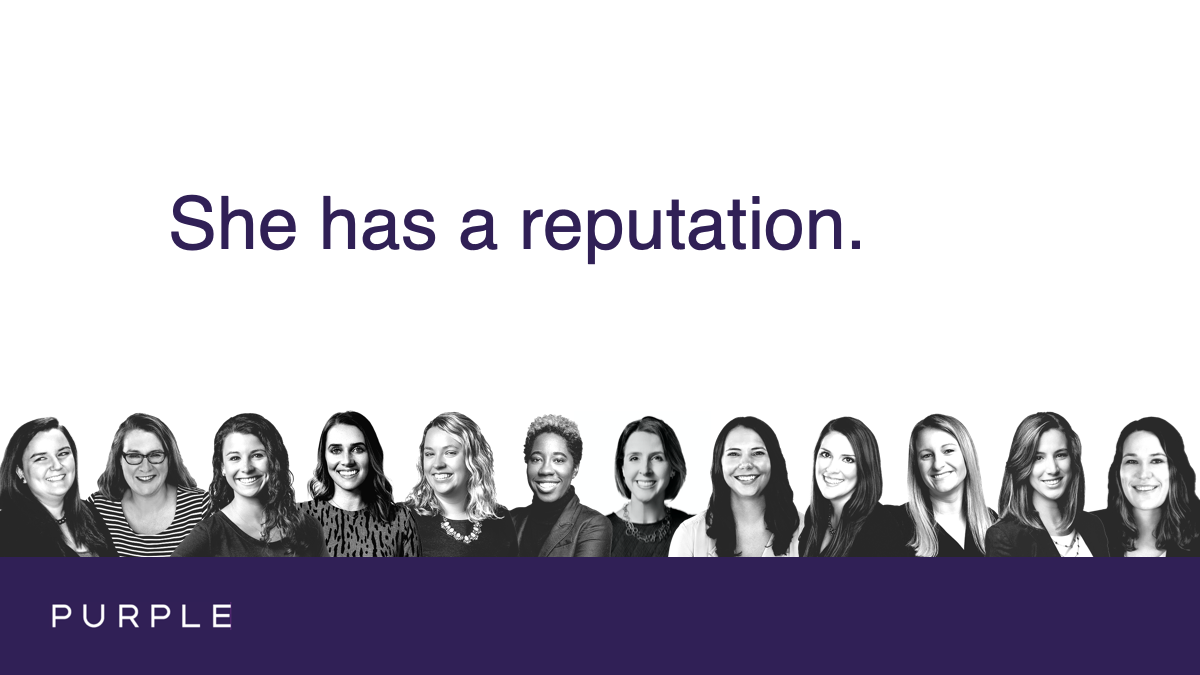
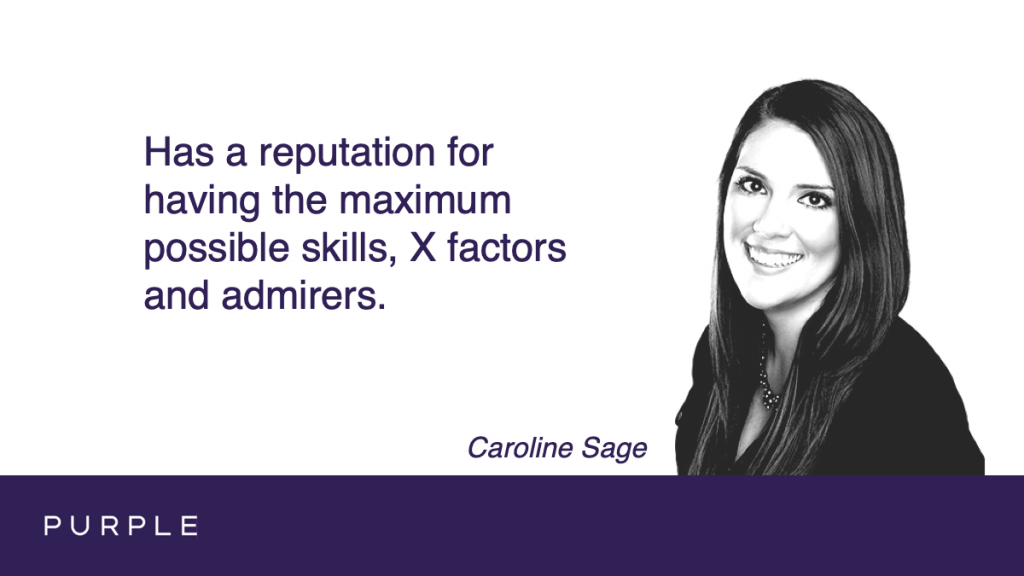
Her extreme skill at drilling down deep to understand the most challenging issues facing clients is just the beginning. Purple people can’t say enough about Caroline Sage.

An experienced researcher, field organizer, political campaigner and corporate strategist, Chinasa Onukwubiri brings lessons from her work around the globe to clients and causes.

Building on earlier work in politics and campaigns, Crystal Benton develops strategies to enhance and protect reputation, influence policy debates, and drive business growth. Serving strategy always.

As MD of Insights Operations, Denise Brien leads teams in the design and implementation of research that delivers the powerful insights behind countless successful client campaigns. And those teams love her.

Our Diana Muggeridge is a campaign strategist who’s passionate about helping industry-leading organizations navigate challenges impacting their license to operate. Our team is passionate about how great she is.

There are few people as Purple as Elizabeth Emanuel. This near-lifer has held just about every role someone can hold at our firm – and done so fearlessly – and we’re grateful she chooses to call Purple home.

A former boss of Katie Pudwill once described her as the walking, talking embodiment of “North Dakota nice.” It was true when she was in politics and journalism, and it’s true today in her work with Purple. Love.

With broad issue-advocacy experience spanning agribusiness, energy and human rights, Keeley Hanlon has worked across the aisle to make the business case for social change. We see it as a bit of magic.

The brilliant Nicki Zink brings a uniquely valuable perspective, drawn from prior experience working in the non-profit sector and political journalism. The headline here is that Nicki is the best.

At Purple, Savannah Bailey works closely with clients to develop and execute campaigns to manage high-pressure issues. It’s why her ability to stay cool, calm and collected stands out.

A political polling expert and strategist who grew up in campaigns, Sarah Simmons learned how to relentlessly work a problem. Anything can be solved. That energy fuels the people around her.

Before navigating complex challenges for clients in industries from energy to education and labor to logistics, Tara Andersen dives into the research with glee. No wonder everyone wants her on their team.

Posted on
March 12, 2020
1 Min. Read
Author
Rory Cooper
Reputation and the Coronavirus
Purple’s Rory Cooper recently authored a client memo with observations, context and recommendations on building and protecting reputation amidst the global spread of the Coronavirus that was mentioned in the March 12, 2020 edition of POLITICO Influence.
To request a copy of the memo or learn more about Purple’s experience helping clients navigate complex issues, email: rory.cooper@purplestrategies.com
From POLITICO Influence, March 12, 2020.
MORE CORONAVIRUS MEMOS: As more and more Americans stay home from work due to the coronavirus, Washington consultants are still at work, drafting memos to clients on how they should respond to the pandemic. “Companies shouldn’t feel compelled to immediately change their prices, services or policies, but should be compelled to review them and review them again periodically,” Rory Cooper of Purple Strategies wrote in a memo to clients on Wednesday. “Are there business plans in place that are perfectly normal in a routine environment but could be seen in a different light amidst a pandemic?”
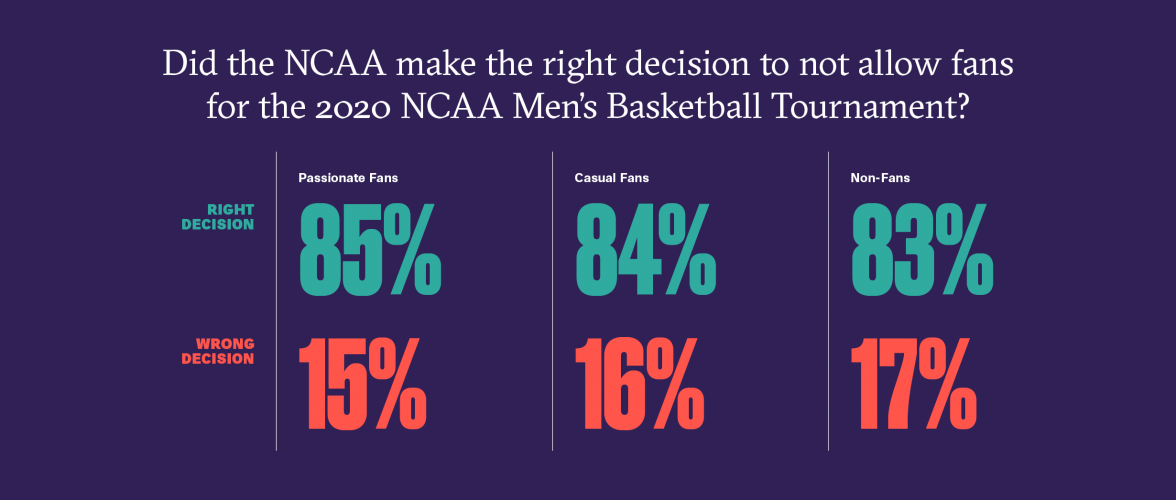
Posted on
March 12, 2020
1 Min. Read
Author
Bradley Engle
Overwhelming support for NCAA’s decision to not allow fans for 2020 March Madness
As a huge college basketball fan on a six-year streak of going to the Final Four, I’m disappointed that there will be no fans in the crowd for March Madness, but it was the right call.
And Americans agree. A Purple Pulse Poll found 84% of the informed public believe the NCAA’s decision to close arenas to fans was the right one.
And among the most passionate March Madness fans, 43% said they would be even more likely to watch games. Only 8% said it would cause them to watch less.
The decision to prioritize player and public health is likely to give the NCAA a much needed boost to its reputation, which has been under fire for years. Among those who regularly follow sports news, 52% believe the NCAA would do anything to maintain its power even if it meant harming student athletes (compared to only 21% who believe they would sacrifice power for the good of student athletes). But making this difficult decision around their marquee event will likely serve as powerful evidence of their commitment to student athletes, with the March Madness decision leading sports fans to a 62% favorable/11% unfavorable view of the NCAA.
Purple Pulse Survey of the Informed Public. N=1,000. March 11-12.
For more information please contact: bradley.engle@purplestrategies.com

Posted on
January 24, 2020
2 Min. Read
Author
Purple Strategies
Purple Welcomes Rebecca Ballard to Help Lead Communications, Marketing and Employee Engagement
Purple Strategies, a leading strategy and reputation management firm, has welcomed award-winning communications and organizational culture leader Rebecca Ballard as managing director, communications, marketing and engagement. In the newly created role, Ballard will build out and lead internal and external communications on behalf of the firm as it begins its second decade helping some of the world’s most important organizations address their most important challenges and opportunities.
“Rebecca’s deep experience partnering with both client- and agency-side leaders through times of growth and change will be an invaluable asset for us at Purple as we start on our next 10 years,” said Kristen Morgante, partner and COO at Purple. “Her work at the intersection of communications, strategy and talent is very much aligned with the Purple culture and approach, and we’re thrilled to welcome her to the team.”
Ballard began her career at Public Strategies, a business advisory firm specializing in public affairs, crisis management and public opinion research. Her work with the firm for nearly a decade covered a broad spectrum of industry sectors, including automotive, retail, manufacturing, health care, energy, and financial and professional services. In 2011 when the firm merged with Hill+Knowlton Strategies, a global communications consultancy and public relations network, Ballard took on a series of roles leading communications for the agency and developing its people and culture. Most recently, Ballard was head of communication and culture for H+K U.S. and founder and executive director of the firm’s women’s network.
Ballard was named to the PRWeek 40 Under 40 class in 2014, and in 2016 was named to the inaugural class of the PR News Diversity in PR Individuals of the Year. In 2018 Ballard was elected to serve as co-chair of the PR Council’s “PRC Next” shadow board of directors of next-generation industry leaders.
“I’ve watched through the years as Purple has built a reputation for being both a true strategic partner to clients in times of immense change, as well as a great place for great people to work, so I couldn’t be more excited about the opportunity to contribute to what’s next for Purple,” Ballard said.
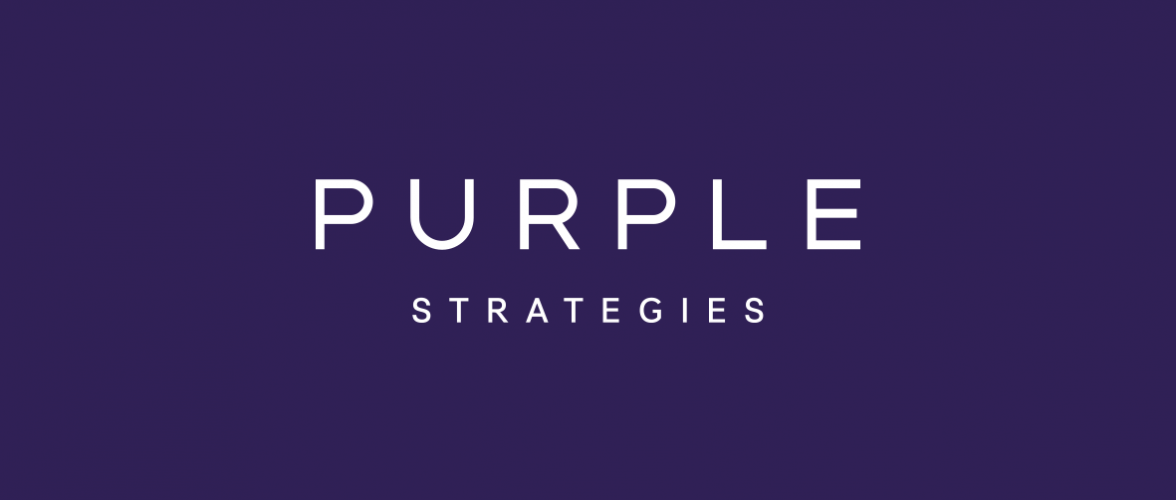
Posted on
December 19, 2019
2 Min. Read
Author
Purple Strategies
Purple Promotes Chris Durlak to Partner
WASHINGTON and CHICAGO, Dec. 19, 2019 — Purple Strategies, a leading strategy and reputation management firm with offices in Alexandria, Virginia and Chicago, Illinois has made Chris Durlak a partner. Durlak joined Purple as the firm was founded and was previously a media strategist with McMahon Squier & Associates before it joined with Alex Castellanos to form Purple.
“Chris truly embodies the very best of Purple,” said Steve McMahon, CEO and Co-Founder of Purple. “He is a gifted strategist and trusted client counselor who has proven himself to be an indispensable and in-demand partner to some of the most valuable companies in the world as they tackle incredibly complex reputation and advocacy challenges.”

Durlak has advised senior corporate and communications leaders at companies in the U.S. and globally, across categories that include energy, consumer packaged goods, health care, pharmaceutical, sports and gaming, food and beverage, financial services, defense and aviation, trade associations, and nonprofits. He also serves on the Board of Trustees for the George Mason University Foundation, which administers private gifts made in support of the University.
“What sets Chris apart is not only what he does – which is lead clients to be the best version of themselves as they manage their reputation, but how he does it – with a spirit of generosity and a humility that is rare today. As Chris has grown at Purple, he’s been a driving force in growing others, always paying it forward and bringing his team members along,” shared Alex Castellanos, Chairman and Co-Founder of Purple.
Durlak’s elevation to partner comes as the firm marks its 10th year in business working with Fortune 500 companies and large industry associations on brand reputation and issue advocacy campaigns. Purple has been a longtime partner to clients like BP, McDonald’s, Coca-Cola and PhRMA. In addition to McMahon and Castellanos, Durlak joins a partnership that includes Mark Squier, a founding partner; Kristen Morgante, the firm’s Chief Operating Officer; Jillayne Smyth Rogers, the firm’s Chief Creative Officer; and John Gatti, who leads Purple’s Chicago office.
“I’m honored and humbled by the opportunity to become a partner,” said Durlak. “Steve McMahon, Alex Castellanos and Mark Squier have been incredible mentors to me. Purple is a one-of-a-kind place that continues to do groundbreaking work in corporate reputation. I look forward to continuing to find new and innovative ways to serve our clients.”
PR Newswire: https://www.prnewswire.com/news-releases/purple-strategies-promotes-chris-durlak-to-partner-300977284.html
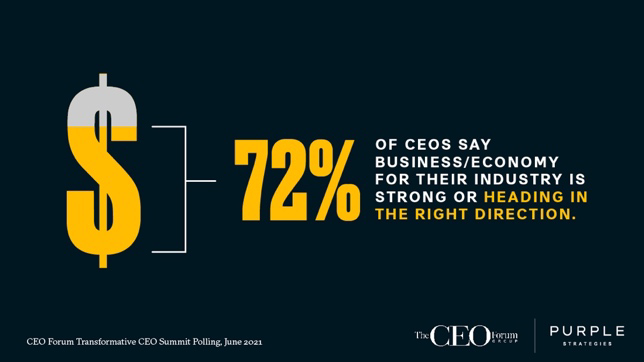
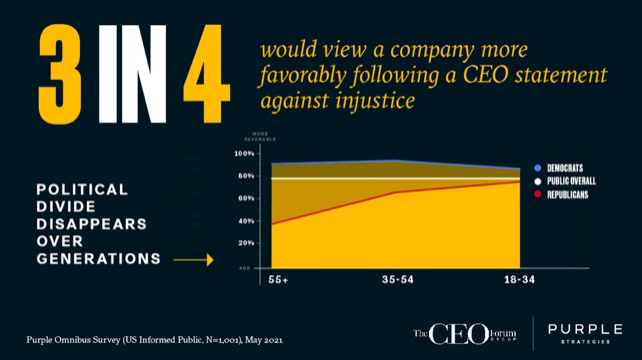
 AI and Paradigm Shifts on the Minds of Healthcare CEOs
AI and Paradigm Shifts on the Minds of Healthcare CEOs  Purple Strategies Elevates Three To Partnership Group
Purple Strategies Elevates Three To Partnership Group